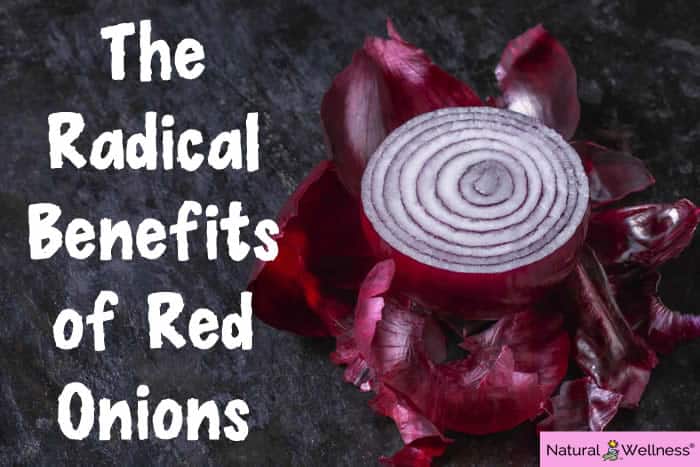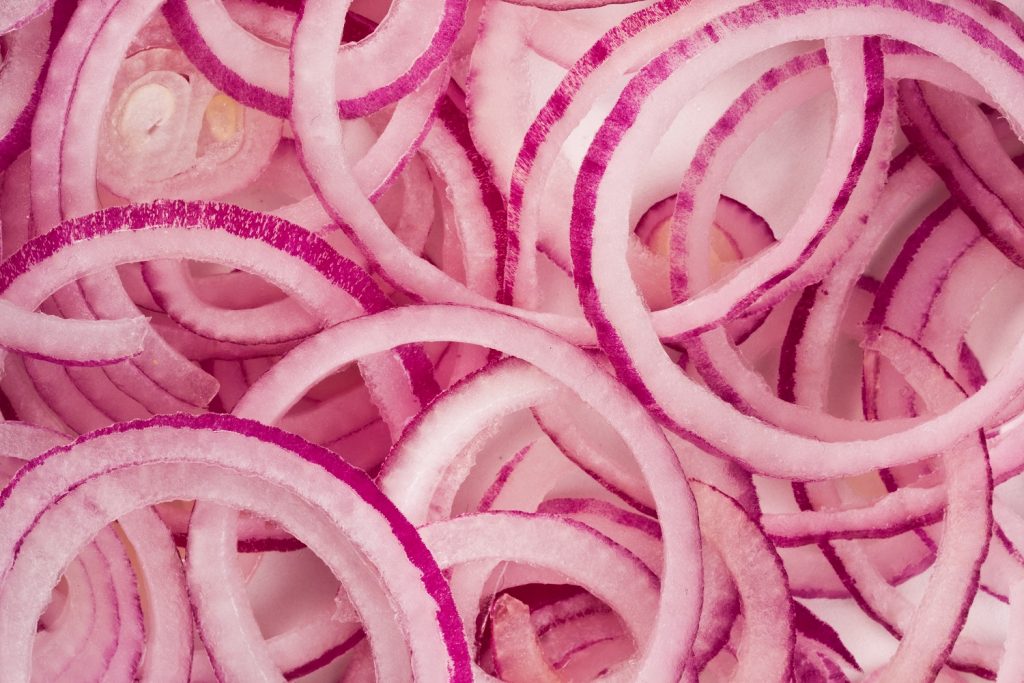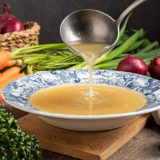

This beautiful purple root vegetable is more than just a crunchy addition to any sandwich, salad, or burger. As you peel back the layers it appears that the benefits of red onions get better and better.
Consumed around the globe, onions are the most common allium vegetable and are eaten both raw and cooked.
You’ll find red onions adding flavor to:
- chutneys
- slaws
- marinades
- grills
- sautés
- and bakes alike.
But the onion train doesn’t stop at flavor town. We want to explore the red onion inside and out with the intention of answering burning questions like ‘what are the health benefits of red onions?’
- And if you’re like the rest of us and ever pondered losing a few pounds or changing your diet, we’d also like to find out, ‘are red onions good for weight loss?’
- Is it better to eat red onions raw or cooked?
- Are red onions the greatest vegetable in the known universe?
All of these red onion answers follow below. And we may even throw in some incredibly delicious red onion recipes at the end for good measure!
The Benefits of Red Onions

Since everyone is wondering, let’s address the most common red onion question first: Are they better raw or cooked? From a nutritional standpoint, it’s definitely raw red onions all the way. From a flavor standpoint…well, that’s open for debate.
When eaten raw, red onions provide significantly more sulfur. Sulfur is important because, as a compound, it has been associated with cancer prevention in lab settings as well as helping manage and lower blood pressure and cholesterol levels (10).
According to Tufts University, sulfur also helps break down blood clots and helps lower the risk of heart disease and stroke. Cooking red onions decreases the sulfur compound quality and quantity.
Fun red onion fact: that same sulfur is what gets released into the air and makes your eyes tear up when raw red onions are crushed or sliced.
But why stop at sulfur? The major flavonoids contained in raw red onions are quercetin aglycone, quercetin-4′-O-monoglucoside, quercetin-3, 4′-O-diglucoside, and anthocyanin (6). Most of the quercetin can be found in the outer layers of red onions and helps fight free radicals that accumulate in the body.
Furthermore, according to the National Onion Association, red onions are also very high in vitamin C which, as many of you know, is a powerful antioxidant that protects against cell damage and helps support the immune system (8).
But how can one enjoy all the benefits if they don’t like onions? Glad you asked.
Taking a daily supplement like Natural Wellness’s Alpha Lipoic Acid can be a great way to support your body with a super antioxidant and the health benefits red onions provide, without actually having to eat or prepare red onions.
Red Onions Can Fight the Common Cold
According to the CDC, the average adult American gets 2-3 colds on a yearly basis (1). That’s why interest recently piqued when Science Reports published some red onion research from a team of South Korean researchers. They observed that red onion extract significantly reduced sneezing in mice who have allergic rhinitis (more commonly known as hay fever or seasonal cold allergy) (2). The findings were very encouraging to advocates of natural wellness remedies.
If your cold symptoms include a swollen throat or sinuses, red onions may also help. As a powerful anti-inflammatory agent, quercetin can also relax the muscles that control airways and may help relieve asthma symptoms (10).
And, don’t forget, once you’re over the cold, red onions and the polyphenols therein may be a great way to clear free radicals and boost your immune system at the same time.
Red Onion’s Role in Cancer Prevention
It may sound like a wide scope, but in addition to your seasonal allergies, red onions and onion extracts rich in flavonoids like quercetin have been found to reduce oxidative stress. Epidemiological evidence suggests that eating foods and drinking beverages rich in flavonoids are also correlated with lowering the risk of being diagnosed with a variety of diseases, including many varieties of cancer (9).
In a recent study out of China, allium vegetables, of which red onions are the most common, were found to be preventative against colorectal cancer (4). This may also be a clue in answering the question, are red onions good for weight loss? But we’ll get to that in a minute.
Red Onion Benefits for Your Skin

If onions don’t agree with your taste buds or your general culinary constitution, you’ll be happy to know that getting your daily dose of red onions can come in the form of an extract or even a topical ointment or gel. In fact, onion-based topical ointments may be a powerful tool for anyone dealing with any sort of scarring.
In a randomized, controlled, double-blind study conducted back in 2012, researchers found that “onion extract gel is safe and significantly improves scar appearance after four weeks of once-daily application (3).”
The Journal of Wound Care also published an article back in 2007 supporting the use of red onion extracts in conjunction with more common silicon treatments having been observed to improve hypertrophic and keloid scars (5).
Red onion ointments or gels are also a great option for anyone dealing with scarring who wants to be using products with all-natural ingredients. Using an onion extract, ointment, or gel also circumvents two of red onions’ biggest drawbacks – bad breath and being onion-eyed. Red onion extract specifically was also found to have antimicrobial and antibiofilm properties (6).
And looking just slightly beyond the skin, red onions, due to how rich they are in sulfur, appear to be great for hair. Keratin, another important protein for hair is also sulfur-rich and promotes thick, strong hair. Who knew red onion could become a key component of your beauty routine?
Are Red Onions Good for Weight Loss?

As mentioned above, red onions were found to prevent colorectal cancer, which leads us to believe they may be the most valuable allium vegetable around. While red onions are easily the most common, other allium vegetables include:
- garlic
- onions
- leeks
- chives
- scallions
- and shallots.
All of these are rich in flavonols and organosulfur compounds, which have been shown to provide tumor and cancer-inhibitory properties in laboratory settings (10).
And let’s not forget that red onions are also a good source of fiber and protein. Fiber can help with weight management and promote weight loss by helping clean your intestines, aiding in digestion, and easing constipation.
At the end of the day it’s best to get your red onions raw, but cooking them can be everso tasty, albeit slightly less nutritious. That’s why we want to leave you with two delightful recipes that incorporate raw and cooked red onions respectively, courtesy of giverecipe.com and countryliving.com.
- Raw: You can always toss some thinly sliced red onions into any salad or sandwich, but if you’re feeling a little more creative, one of our favorite red onion dishes that not only incorporates but truly highlights raw red onions is the classic Turkish dish called sumac onions. Find a great recipe for it here.
- Cooked: Respectively, one of the tastiest ways to eat red onions cooked is to simply roast them. Roasting onions is easy and only includes a small handful of ingredients that you likely already have in your kitchen. Follow this recipe to attain roasted red onion perfection, making for a great warm side dish to any entree.
In Conclusion
Let’s review the red onion essentials. Red onion benefits for skin are bountiful. It is more nutritious, but not necessarily preferred to eat red onions raw. When your friends ask you, “Are red onions good for weight loss?” you can answer with a confident, YES. And we conclude feeling satisfied having answered the multifaceted question, “What are the benefits of red onions?”
But don’t just lean on red onions or any single variety of fruit or vegetable to get all the nutrition you need. Vary your diet. And while eating right is one thing, ensuring you’re absorbing all of the essential vitamins and nutrients you need can be as simple as taking a daily supplement or nutritional shake. It’s a great way to guarantee you’re getting what you need in addition to eating right and knowing what ingredients to use in the kitchen.
And as always, consult your doctor before making any extreme changes to your diet. Be safe. Be natural. And be well.




